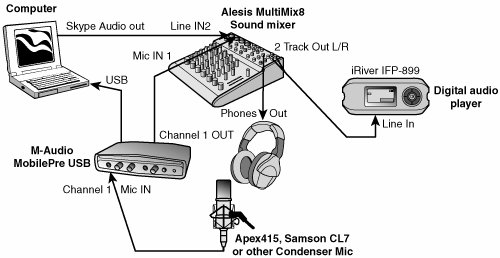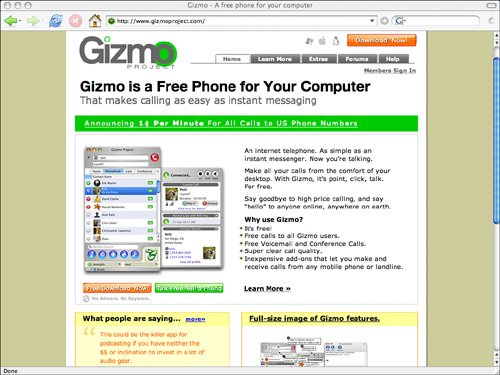Using Skype and Other VoIP Services
| When it comes to conducting the interview, in most instances you will be at one location and your guest will be at another. One way to record the conversation is to go to RadioShack and pick up a $20 phone recorder adapter. And if you do this, then guess what? Your interview will sound like you recorded it with a $20 phone adapter. This is not a good thing. If you are lucky enough to be interviewing someone who is technically savvy, you should have the option of recording a Skype-to-Skype conversation (www.skype.com) using Voice over Internet Protocol (VoIP) technology. Skype offers digital voice communication, which means you will be getting the full spectrum of your voice, making for a warm sound. Some podcasters have gone out and purchased $700, $800, and even $2,800 phone hybrid recording setups. In our opinion this is not money well spent. These hybrid systems run over standard phone lines, known as POTS (Plain Old Telephone System). Because POTS limits the bandwidth of the voice (which causes that tinny, hollow sound you are used to when you talk on the phone), even with a $2,800 Blue Box you won't get as good a sounding recording as you will with a good Skype-to-Skype call. Unfortunately, no matter how good your phone setup is, Skype or otherwise, the quality of the call will always be limited by your guest's phone. With a Skype-to-Skype call, you are getting the full spectrum of the voice and you can use much better microphones on each end than are found in a traditional phone mouthpiece. A good Skype-to-Skype call and recording sounds almost as good as having the person in the studio with you, and many times your listeners will not be able to tell the difference. That will never be the case with even the best phone hybrid, no matter how much you are willing to spend. What if your guests are not technically savvy and most, if not all of your interview guests will be on a standard landline phone or cell phone? Should you then look at getting a phone hybrid? The answer in our opinion is still no. You can use "Skype Out" to make the calls to their landline or cell phone. Skype Out is a pay service (about $0.02 per minute), whereas Skype-to-Skype is completely free. But even at $0.02 per minute, it is going to take over 500 hours of calls to equal the cost of a low-end phone hybrid system. Plus, if you are not someone who has unlimited long distance, at $0.02 a minute you will actually be saving money each phone call. It should also be pointed out that software phone hybrids are available, but these will also suffer the same limitations as the hardware hybrids in that they also use POTS to transmit the call and you will still be limited by the quality (or lack thereof) of the guest's phone. Recording an Interview with SkypeCaution After you connect with the guest, feel you have properly matched up the levels, and are ready to start the interview, pan your channel all the way to the left and the guest's all the way to the right. This allows you to split the audio during post-production if you need to adjust the volume levels for a better match. When you are doing Skype Out calls, panning left and right is really important, because what you think is a matching volume level oftentimes is not even close when you hear the final version. Plus, with the person on the other end being on a phone, there is usually a low-frequency buzz you will want to filter out. Podcasters record Skype calls using a few different techniques. Some do it completely on the computer using software such as Audio Hijack Pro (Mac) or Hot Recorder (PC). But the method we like to use is to take the audio out of the computer and use a mixer to record on an external digital recorder. Figure 7.2 shows Rob's setup for recording Skype calls. There are numerous reasons for using this kind of setup:
Figure 7.2. The Skype recording setup Rob uses for podCast411. List of VoIP ServicesUp to this point, we have talked mostly about Skype, and there is a good reason why. It is the de facto standard for VoIP communication in the podcasting community. It offers some very nice features, including IM (instant messaging) and the ability to transfer files. At any given point in time at least 2 million people are online with Skype. But Skype is not the only VoIP software; we will quickly talk about a few others in this section. This is not a complete list, just the ones most popular in the podcasting community. We are also only listing those services that are free, so we will not be talking about Vonage, Packet8, Lingo, or any other similar service.
Figure 7.3. Gizmo Project is a quality VoIP service that rivals Skype.
Note Google is not one to release a service and have it be second-rate (although right now Google Talk is not even third-rate to be quite honest), and we do expect Google to put in the resources necessary to make this service equal to Skype and Gizmo in the near future. |
EAN: 2147483647
Pages: 162